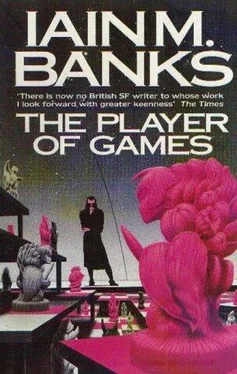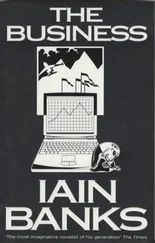Mr Dreltram laughed too, and wiped his face with a handkerchief.
Gurgeh played furiously for the next few moves, and had to be reminded by his opponent when the eighty-move deadline came up. Gurgeh turned over his hidden piece without having checked it first, risking it occupying the same square as one of his revealed pieces. The hidden piece, on a sixteen-hundred-to-one chance, turned up in the same position as the Heart; the piece the whole game was about; the piece one’s opponent was trying to take possession of.
Gurgeh stared at the intersection where his well-defended Heart piece sat, then again at the coordinates he’d dialled at random on to the wafer, two hours earlier. They were the same, there was no doubt. If he’d looked a move earlier, he could have moved the Heart out of danger, but he hadn’t. He’d lost both pieces; and with the Heart lost, the game was lost; he’d lost.
“Oh, bad luck,” Mr Dreltram said, clearing his throat.
Gurgeh nodded. “I believe it’s customary, at such moments of disaster, for the defeated player to be given the Heart as a keepsake,” he said, fingering the lost piece.
“Um… so I understand,” Mr Dreltram said, obviously at once embarrassed on Gurgeh’s behalf, and delighted at his good fortune.
Gurgeh nodded. He put the Heart down, lifted the ceramic wafer which had betrayed him. “I’d rather have this, I think.” He held it up to Mr Dreltram, who nodded.
“Well, of course. I mean, why not; I certainly wouldn’t object.”
The train rolled quietly into a tunnel, slowing for a station set in the caverns inside the mountain.
“All reality is a game. Physics at its most fundamental, the very fabric of our universe, results directly from the interaction of certain fairly simple rules, and chance; the same description may be applied to the best, most elegant and both intellectually and aesthetically satisfying games. By being unknowable, by resulting from events which, at the sub-atomic level, cannot be fully predicted, the future remains malleable, and retains the possibility of change, the hope of coming to prevail; victory, to use an unfashionable word. In this, the future is a game; time is one of the rules. Generally, all the best mechanistic games — those which can be played in any sense ‘perfectly’, such as grid, Prallian scope, ’nkraytle, chess, Farnic dimensions — can be traced to civilisations lacking a relativistic view of the universe (let alone the reality). They are also, I might add, invariably pre-machine sentience societies.
“The very first-rank games acknowledge the element of chance, even if they rightly restrict raw luck. To attempt to construct a game on any other lines, no matter how complicated and subtle the rules are, and regardless of the scale and differentiation of the playing volume and the variety of the powers and attributes of the pieces, is inevitably to shackle oneself to a conspectus which is not merely socially but techno-philosophically lagging several ages behind our own. As a historical exercise it might have some value. As a work of the intellect, it’s just a waste of time. If you want to make something old-fashioned, why not build a wooden sailing boat, or a steam engine? They’re just as complicated and demanding as a mechanistic game, and you’ll keep fit at the same time.”
Gurgeh gave an ironic bow to the young man who’d approached him with an idea for a game. The fellow looked nonplussed. He took a breath and opened his mouth to speak. Gurgeh was waiting for this; as he had on the last five or six occasions when the young man had tried to say something, Gurgeh interrupted him before he’d even started.
“I’m quite serious, you know; there is nothing intellectually inferior about using your hands to build something as opposed to using only your brain. The same lessons can be learned, the same skills acquired, at the only levels that really matter.” He paused again. He could see the drone Mawhrin-Skel floating towards him over the heads of the people thronging the broad plaza.
The main concert was over. The mountain summits around Tronze echoed to the sounds of various smaller bands as people gravitated towards the specific musical forms they preferred; some formal, some improvised, some for dancing, some for experiencing under a specific drug-trance. It was a warm, cloudy night; a little farside light shone a milky halo directly overhead on the high overcast. Tronze, the largest town on both the Plate and the Orbital, had been built on the edge of the Gevant Plate’s great central massif, at the point where the kilometre-high Lake Tronze flowed over the lip of the plateau and tumbled its waters towards the plain below, where they fell as a permanent downpour into the rain forest.
Tronze was the home of fewer than a hundred thousand people, but to Gurgeh it still felt too crowded, despite its spacious houses and squares, its sweeping galleries and plazas and terraces, its thousands of houseboats and its elegant, bridge-linked towers. Tronze, for all the fact that Chiark was a fairly recent Orbital, only a thousand or so years old, was already almost as big as any Orbital community ever grew; the Culture’s real cities were its great ships, the General Systems Vehicles. Orbitals were its rustic hinterland, where people liked to spread themselves out with plenty of elbow room. In terms of scale, when compared to one of the larger GSVs containing billions of people, Tronze was barely a village.
Gurgeh usually attended the Tronze Sixty-fourth Day concert. And he was usually buttonholed by enthusiasts. Normally Gurgeh was civil, if occasionally abrupt. Tonight, after the fiasco on the train, and that strange, exciting, shaming pulse of emotion he’d experienced as a result of being thought to cheat, not to mention the slight nervousness he felt because he’d heard the girl off the GSV Cargo Cult was indeed here in Tronze this evening and looking forward to meeting him, he was in no mood to suffer fools gladly.
Not that the unlucky young male was necessarily a complete idiot; all he’d done was sketch out what had been, after all, not a bad idea for a game; but Gurgeh had fallen on him like an avalanche. The conversation — if you could call it that — had become a game.
The object was to keep talking; not to talk continuously, which any idiot could do, but to pause only when the young man was not signalling — through bodily or facial language, or actually starting to speak — that he wanted to cut in. Instead, Gurgeh would stop unexpectedly in the middle of a point, or after having just said something mildly insulting, but while still giving the impression he was going to keep talking. Also, Gurgeh was quoting almost verbatim from one of his own more famous papers on game-theory; an added insult, as the young man probably knew the text as well as he did.
“To imply,” Gurgeh continued, as the young man’s mouth started to open again, “that one can remove the element of luck, chance, happenstance in life by—”
“Jernau Gurgeh, not interrupting anything, am I?” Mawhrin-Skel said.
“Nothing of note,” Gurgeh said, turning to face the small machine. “How are you, Mawhrin-Skel? Been up to any fresh mischief?”
“Nothing of note,” the tiny drone echoed, as the young man Gurgeh had been talking to sidled off. Gurgeh sat in a creeper-covered pergola positioned close to one edge of the plaza, near the observation platforms which reached out over the broad curtain of the falls, where spray rose from the rapids lying between the lip of the lake and the vertical drop to the forest a kilometre below. The roaring falls provided a background wash of white noise.
“I’ve found your young adversary,” the small drone announced. It extended one softly glowing blue field and plucked a nightflower from a growing vine.
Читать дальше












